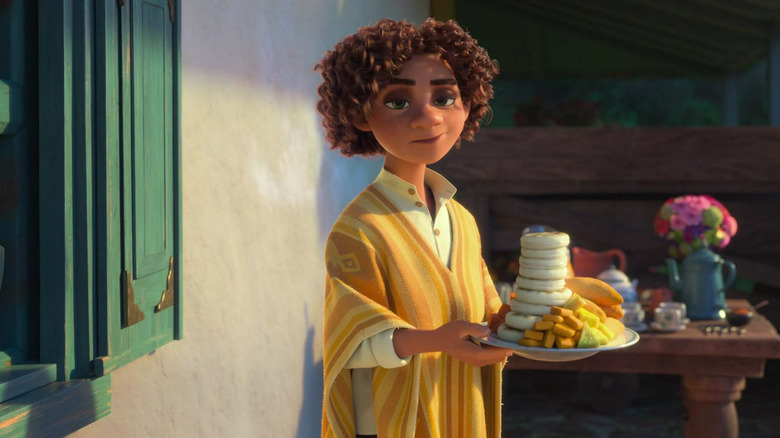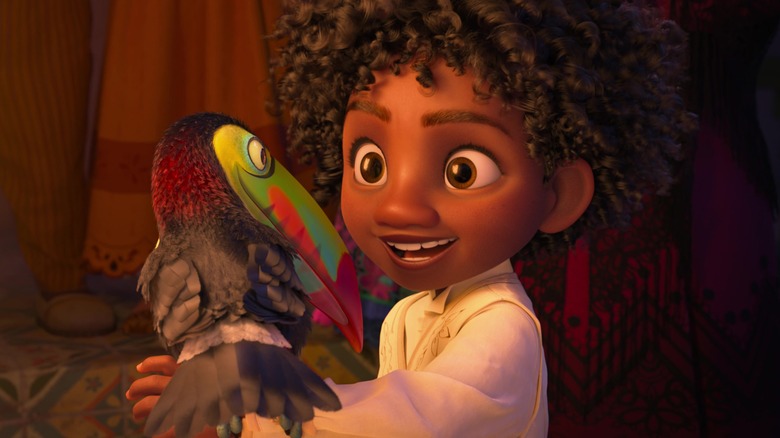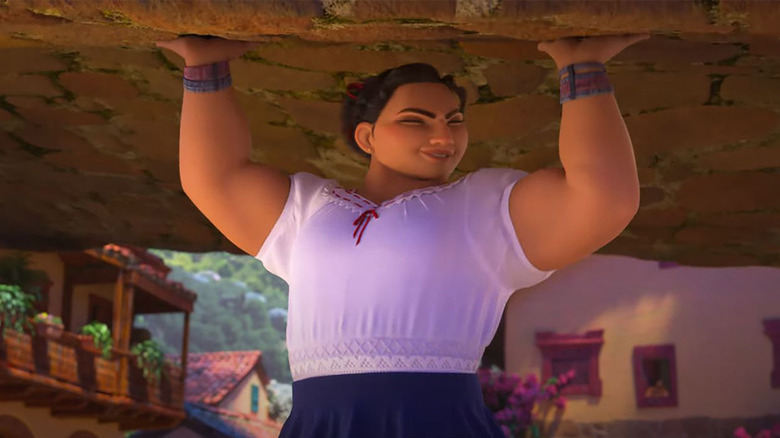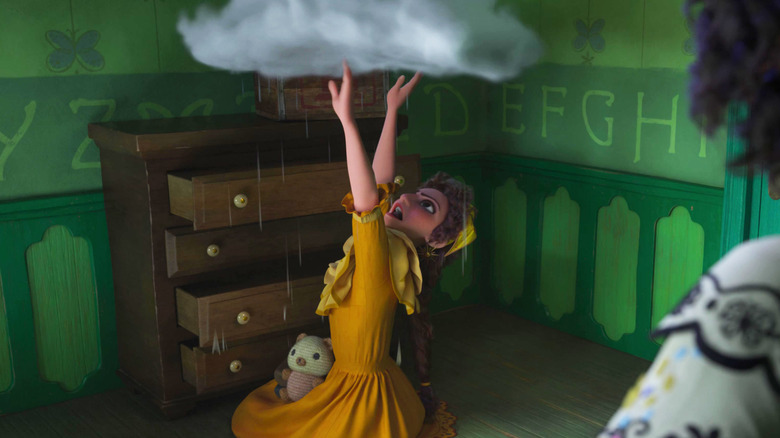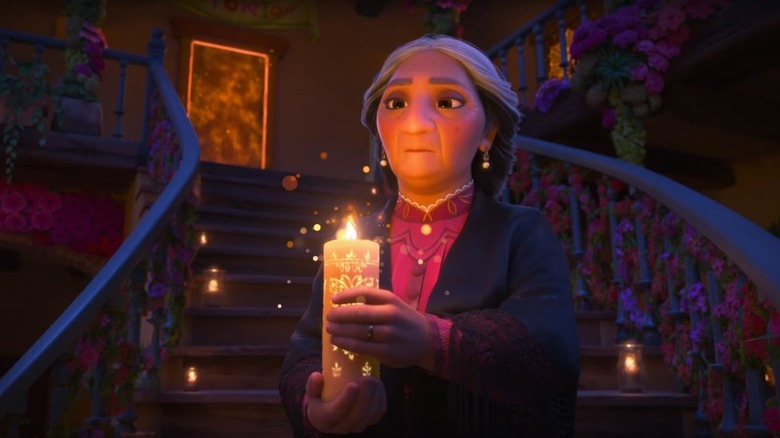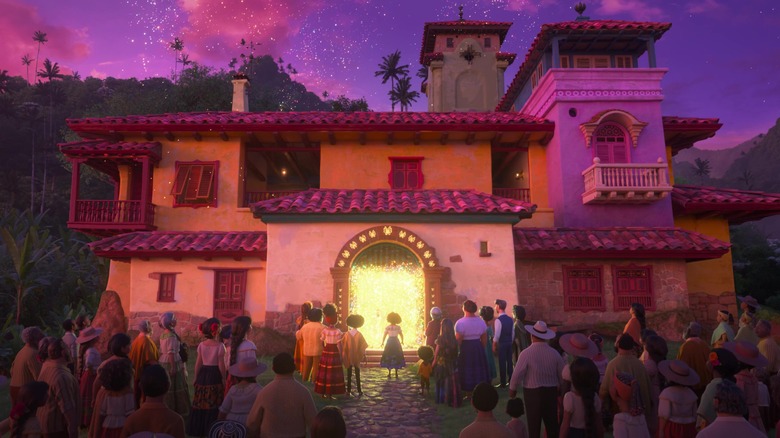Every Encanto Character's Power Ranked
Disney has mixed fairy tales and superpowers in the hit film "Encanto." This delightful feature tells the story of the Madrigal family, who live in a magically protected village in the Colombian mountains. Each of them has been gifted a special power, which they use to keep their village safe and its people healthy, happy, and secure. The miracle began with stoic Alma, the family's matriarch. In the midst of an armed conflict, she and her husband Pedro were forced to flee their home with their infant triplets, Julieta, Pepa, and Bruno. Before they could get to safety, however, Pedro was killed. In the wake of this tragedy, the candle Alma carried turned magical, granting her the miracle of a sentient "Casita" to live in with her children. In time, it blessed those children, and their children, with their abilities.
Alma and the other refugees built a community protected by the candle's magic and the Madrigals' gifts. A couple of generations later, however, Alma's granddaughter Mirabel fails to gain a gift at all — or at least, that's what appears to happen. Mirabel makes the best of this, introducing audiences to her miraculous family in a jaunty opening number that details all of their abilities. While each power is impressive, some are clearly stronger than others. Let's take a look at every "Encanto" character's power, ranked from least useful to most.
Camilo the shapeshifter
Starting off our list is the energetic Camilo (Rhenzy Feliz). He's Pepa and Félix's middle child, stuck between older sister Dolores and younger brother Antonio. Camilo has the power to change his shape, which he most often uses to mimic those around him. He's a playful character who loves to trick his family and friends and do goofy impressions: Camilo "won't stop until he makes you smile today," Mirabel sings in "The Family Madrigal." All in all, he seems like a very fun person to be around. Unfortunately, his power is not the most useful to his village.
Throughout the film, Camilo is shown using his power for entertainment. While the villagers all seem to get a kick out of it, he's not really doing much else to help support his community. Other members of his family experience incredible pressure to be useful — Camilo, in contrast, lives a relatively carefree life. This serves a narrative purpose: Like most characters in "Encanto," Camilo was designed to be relatable. As Good Morning America reported, the filmmakers looked to their own families when creating the Madrigals. In Camilo, co-director Charise Castro Smith detailed, they wanted to showcase a teen "who doesn't quite know who they are yet and are trying on a lot of different personas." This makes his powers intriguing from a storytelling perspective, but not the most useful to the village.
Antonio talks to the animals
Audiences get to watch as Antonio (Ravi Cabot-Conyers), the youngest member of the Madrigal family, receives his powers at the beginning of the film. As other characters' powers have been detailed by this point, viewers hotly anticipate what miracle Antonio will be granted. The Madrigals are just as invested, especially Alma. The miracle's inexplicable decision to not grant Mirabel a power when it was her time to receive one still gnaws at her. Alma worries, in fact, that the miracle has no more blessings left to give, though she works hard to hide her anxiety. Luckily, during the ceremony, Antonio is granted the ability to communicate with animals.
This power has a lot of potential, evidenced by the fact that we immediately see Antonio talk to a jaguar. A dangerous animal is transformed into a friend who is no longer a threat to the village with just one conversation. As Antonio grows, he could definitely use this power in a way that might rank him higher on this list. However, he's just a child in "Encanto," which mostly shows him having fun with all his new animal friends. This is very endearing, as Antonio seems to be a bit more lonely than the rest of his family. He chooses to spend his time with Mirabel, who is herself cut off, due to her lack of gift. Antonio's ability to speak with animals ensures he'll never be lonely again, but we don't get much of a glimpse of its full scope.
Dolores' super-hearing
Dolores (Adassa) has super-hearing, which turns out to be one of the most challenging magical gifts. She acts as a constant source of information for those around her, which makes it difficult for her to ever keep a secret. This is made clear when Mirabel and her father are overheard discussing Bruno's vision of the future, which puts Mirabel at the center of the Casita's potential destruction. Dolores can't help but tell the entire family what she heard over dinner, which causes chaos. But Dolores' super-hearing also encourages honesty within the village, and allows her to act as an extra source of protection. This is especially important, as the community was created as a safe haven from violence.
Dolores' power also makes her uniquely sympathetic to Bruno. Everyone else mistrusts and blames him for their problems, but when Mirabel asks about her mysterious uncle in "We Don't Talk About Bruno," Dolores describes him with warmth and understanding. She grasps the heavy burden that comes with seeing the future, perhaps because her own super-hearing weighs upon her in a similar fashion. But for all this kind-heartedness, Dolores isn't able to do much with her gift. It's useful for organizing dinner parties, and it clues her into Bruno's whereabouts before the others know he's in the walls, but ... that's about it. With a bit more willpower, however, Dolores could turn her super-hearing into super-action.
Isabela's control of plants
Isabela (Diane Guerrero), Mirabel's eldest sister, is initially portrayed as being absolutely perfect. She literally has the power of life in her hands, as she can create an endless amount of plants with nothing but a gesture. At first, Isabela limits herself to only growing beautiful flowers. While this does ensure that the village will forever look pretty, her powers turn out to hold far more weight. With help from Mirabel, Isabela realizes that she doesn't have to confine herself to a narrow definition of "perfection," which only holds acres of flawless flowers. "What else can I do?" she asks, in the song of the same name. As it turns out, a whole lot: She proceeds to grow cacti, vines, trees, carnivorous plants, and more, practically in the blink of an eye.
Isabela's powers have the potential to become virtually limitless. Most impressively, she could use her gifts to ensure that the village has vegetation all year round — in her hands, they'd never experience a food shortage, or even be confined to a growing season. However, while Isabela has great potential, we never get to see what she's truly capable of. She's only beginning to push herself as the movie ends, and has far to go. While her miracle is indeed powerful, it's not enough to place her higher on our list just yet.
Luisa's impressive strength
Blessed with super-strength, Luisa (Jessica Darrow), Mirabel's older sister, shoulders a lot of responsibility. She feels as though she can never say no to any request for help — and she gets a lot of requests. Throughout the film, we see the community constantly turn to Luisa for assistance with their animals, homes, and even re-routing rivers. While she never seems to get physically tired, Luisa is mentally exhausted from taking on all these burdens. This is made clear in her song "Surface Pressure," which outlines the crushing duties Luisa feels compelled to take on. She has the weight of the entire village on her shoulders, literally and figuratively.
By the end of "Encanto," Luisa has finally realized she doesn't have to take on every possible responsibility, just because she's strong. While this realization is good for Luisa's mental health, it doesn't take away from just how useful her power has been for the village. Luisa is seen fixing houses and bridges within seconds. Moreover, unlike her younger sisters or cousins, Luisa has full control over her powers, and is well-versed in how to use them. Moving forward, her task is to find a balance between helping others and taking time for herself. If she masters that, she could end up as one of the most powerful characters in the village — but for now, she's perfectly fine where she is in the middle of the pack.
Pepa's weather control
Pepa (Carolina Gaitán) is one of Alma's children and mother to Dolores, Milo, and Antonio. Her gift allows her to control the weather, though it's attuned to her emotional state: Whenever she feels overwhelmed or upset, a storm cloud appears above her head. As her emotions grow stronger, so too does the cloud. When talking to her niece Mirabel about her brother Bruno, she describes how her wedding day began with a lovely cloudless sky. But once Bruno mentioned that it looked like rain, it was all she could think about, resulting in a hurricane. Not a squall, or a sprinkle, or even an outright storm — a full-on hurricane.
The ability to control the weather is indeed a powerful gift (Storm from the X-Men, anyone?). However, Pepa's inability to control her emotions makes her power unstable. Happiness brings sunshine, while frustration brings on the rain, and life brings a whole lot of both at unpredictable intervals. Pepa is often preoccupied with trying to control her emotions and think only happy thoughts, especially at Alma's behest. She is met with spotty success. Luckily, by the end of the film, Pepa has found a way to calm the storm raging inside of her by embracing her emotions instead of trying to suppress them. We already know she can summon hurricanes and snowfall — what else can she do, with a more centered life?
Julieta's healing food
Julieta (Angie Cepeda) is Bruno and Pepa's sister and mother to Mirabel. She's a calming force in the busy Madrigal family, especially since her warmth and kindness not only radiate from her personality, but from her magical gift: Julieta has the ability to heal anyone with her fabulous food. She's shown fixing cuts, a fractured arm, and bee stings with the power of enchanted arepas con queso. This power comes in handy quite often, as you might imagine, especially since her husband tends to be accident-prone in his continuous quest to be useful to the family.
In some ways, Julieta is the opposite of her mother. She embodies a belief in the power of kindness as the guiding force of the village, rather than the miracles themselves. When Mirabel is feeling low, Julieta is absolutely resolute that her daughter is just as special as any of her relatives. However, this doesn't stop her from helping out the village with her incredible ability. Thanks to Julieta, the community has probably never needed any actual doctors — she seems to be able to treat any injury or illness, no matter its type or severity. Are there any limits to her healing? We never see them, if so. While the film never touches on this, it's possible Julieta's powers might even be able to save people from dying, one meal at a time.
Alma's original miracle
None of the magic that fills "Encanto" would be possible without the power of Alma Madrigal's first miracle. It's thanks to her that the village exists, and that her family has the sentient Casita to call home. Just as the miraculous candle grants Abuela the gift of safety, her entire family is blessed with powers of all kind and intensity. As the matriarch of the Madrigal family, Alma is responsible for it all. Her importance cannot be overstated.
However, due to the loss of her husband, Pedro, Alma is consumed with the desire for safety. For her, that means protecting her candle and the miracle it embodies at all costs. She begins to view her loved ones as a way to complete this task, rather than the true gift she was granted, all those years ago. Instead of loving them for who they are, she begins to love them for what they can do — and if they can't do much, they occupy a lesser rung of love. Because of this, she never sees value in Mirabel, who is not outwardly gifted with a power. Luckily, this changes throughout the film, and Mirabel eventually helps Alma see the error of her ways. Once the family's gifts are restored and the Casita returned to wholeness, Alma truly understands the miracle she was given: Love, in whatever form it arrives.
Bruno's visions of the future
Finally, we're going to talk about Bruno (John Leguizamo). Bruno is Alma and Pedro's troubled son, and brother to Julieta and Pepa. Blessed with the power to see the future, Bruno is treated more like someone under a curse than an important seer. While the village is a pretty amazing place to live, problems do still arise in people's everyday lives. As such, when neighbors turn to Bruno for a look into their future, he doesn't just see rainbows and butterflies. This causes most people to look at Bruno with disdain, as if he causes misfortune, rather than simply foreseeing it. This doesn't fit in with Alma's picture-perfect vision of life in the village, which she makes clear. After seeing a distressing vision of Mirabel, Bruno leaves to protect the Madrigal family from the discord such a prediction could bring.
While Bruno's miracle is a burden, it's incredibly valuable to the people of the village, whether they appreciate it or not. Knowing the important moments of life can help people prepare for what's to come, potentially averting the kind of crisis Alma had to flee. Bruno is shunned because he has this knowledge, but if the people embraced it, they could enter a new age of peace. Perhaps they'll do better in the future. Until then, Bruno will live by another superpowered person's motto: With great power comes great responsibility.
Mirabel brings the miracles back
In the end, the most useful power of all comes from a character no one thinks is important. Unlike every other member of the Madrigal clan (save those who marry in), Mirabel (Stephanie Beatriz) isn't blessed with a miraculous gift. Though her family loves her, they also tend to overlook her because of this lack of power. After all, how can she help the village without a special ability, as they are so busy doing? Aside from Antonio, who hasn't received his miracle at the beginning of the film, Mirabel feels like the odd one out. It doesn't help that plenty of villagers, especially the youngest, constantly point out her unique giftlessness.
But Mirabel is miraculous. Throughout the film, she is constantly shown supporting her family. She helps Isabela discover she's more than just the perfect child. She helps Antonio when he's too nervous to accept his gift alone. She helps Luisa when she feels her powers are draining. When the miracle departs, leaving the Madrigal family entirely powerless and the Casita in pieces, Mirabel encourages them to rebuild the old-fashioned way — without powers. Mirabel's gift is to support her family, and to remind people like Alma what's truly important. Once she's able to do that, her family's powers and the Casita are fully restored. While Alma may bring the first miracle, it is Mirabel who saves it, and cements it as an expression of love. There's no greater power than that.

